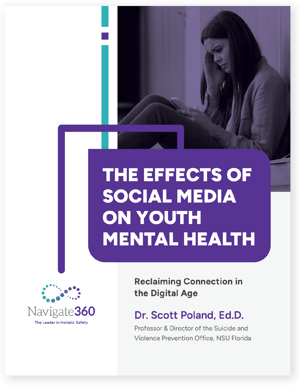Expert Guidance on Social Media & Student Well-Being
Students are spending nearly 5 hours a day on social media, and school leaders must be aware of the impact: anxiety, depression, cyberbullying, and even suicide risk.
In this practical guide, nationally recognized school psychologist Dr. Scott Poland offers clear strategies to help K–12 leaders understand what’s happening, support staff and families, and create a culture that puts connection first.

What Role Does Social Media Play in Mental Health
Today's students are online more than ever, and schools are seeing the consequences. Dr. Poland explores how social media, screen time, and digital pressure are fueling rising rates of anxiety, depression, and suicide ideation—and what educators can do in response.
The State of Youth Mental Health
According to the CDC's Youth Risk Behavior Survey:
- 40% of high schoolers reported feeling hopeless or persistently sad for at least two weeks
- 50% of high school girls reported feeling hopeless or persistently sad for two weeks
- Nearly 1 in 3 boys also reported signficant symptoms of depression
The Data Tells the Story
4.8 hours
Average daily social media use among U.S. teens
41%
High-use social media teens who report poor or very poor mental health
60%
The percentage of poor mental health among heavy users with low parental support
18,000+
Suicide prevention cases opened in Navigate360 Behavioral Case Manager platform last year
Prefer a quick visual overview? Download the infographic to see the data at a glance.
From Screen Time to Support: Practical Answers for Schools
This isn't just another report-it's a clear-eyed roadmap for school leaders who want to address the mental health challenges fueled by social media.
Get answers to questions like:
- How much screen time is too much?
- What can staff do to model better balance?
- How can schools respond without banning phones altogether?

